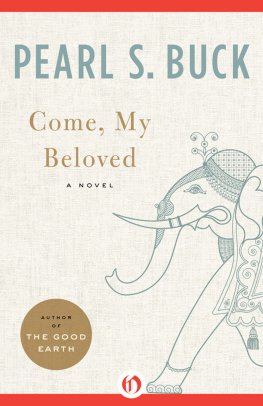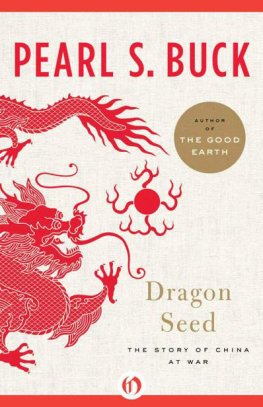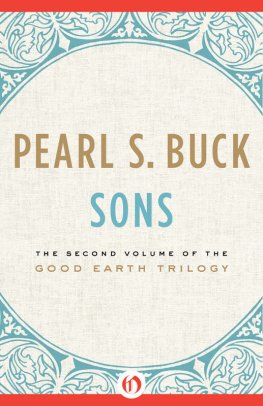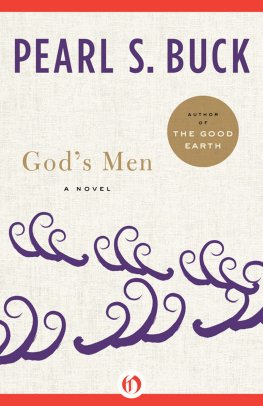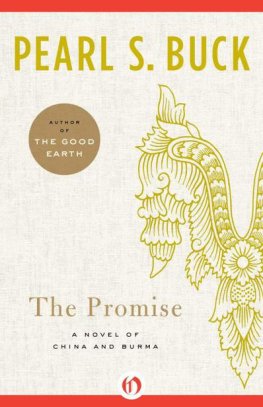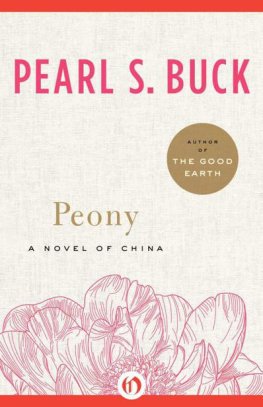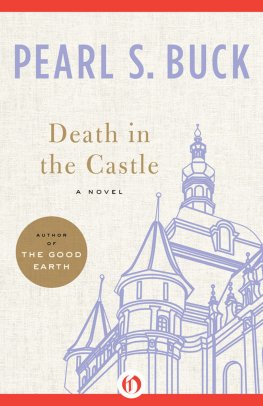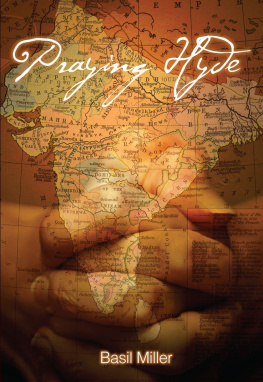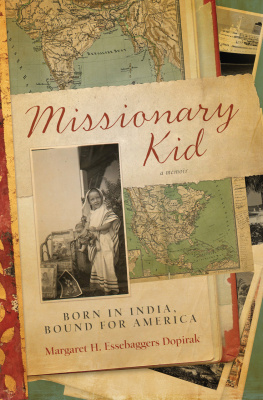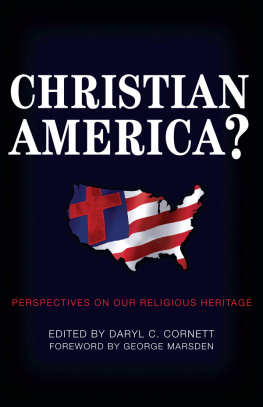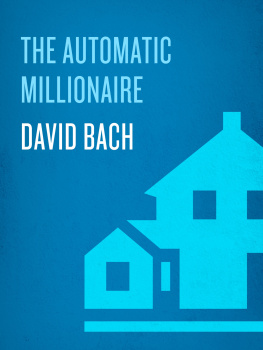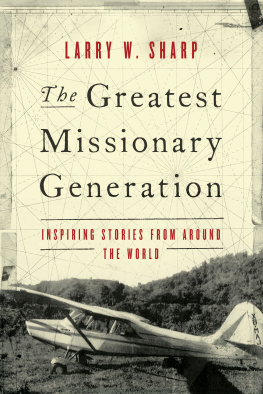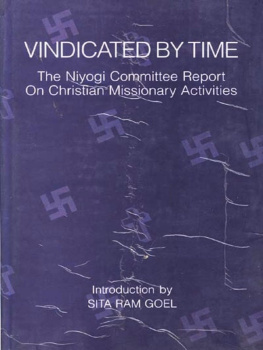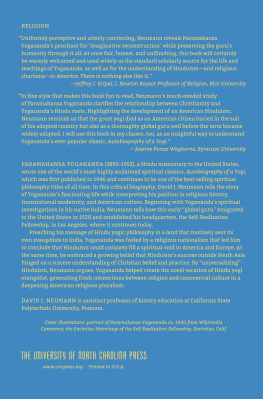Pearl S. Buck
Come, My Beloved
Come, my beloved, let us go forth into the field; let us lodge in the villages.
The Song of Solomon
THE DESK AT THE Grand Hotel in Bombay was crowded with incoming guests. A ship had arrived in harbor that morning and the big lobby was noisy with many tongues, the chief of which was English. It was the English, it was clear to see, who got the first attention. Even a maharajah, encircled by his entourage, was sitting in jealous impatience in one of the big reed chairs. His brilliant headdress, his glittering costume and the fluttering many-colored garments of his entourage made his group look foreign, though this was India. The English, calm and patient, were unconscious of the jealousy of anyone and they stared straight ahead as they stood in line.
Among them was an American, a tall heavily built man of middle age, dressed in a dark grey business suit and a black felt hat. He gazed about him with interested curiosity, as calm in his way as the English, but not afraid to show his enjoyment of the scene. Only America bred men so assured, so naive and so humorous. He surveyed even the Englishmen with eyes amused and tolerant, and he did not hesitate to hold his place in the line, in spite of English pressure, secret but unmistakable, to shove him aside. His broad shoulders retaliated by being immovable as slowly he approached the desk. Once he turned to speak to the tall slender young man behind him, obviously his son. They had the same bold profile, though the son had dark eyes instead of grey and smooth dark hair instead of a red-grey shock. His face was smooth, too, olive skinned, but the father had a close-cut beard and mustache, grizzled red, and his eyes were deepset under fierce eyebrows of the same hue.
Hold hard, son, he said.
I will, his son replied.
The English clerk at the desk threw them a shrewd look as the father wrote his name in the register, David Hardworth MacArd and Son.
Youre from America, sir?
Yes, MacArd said. New York.
He looked thoughtfully at his name for a second and then with a strong stroke he crossed off and Son and turning again he said half humorously,
I guess it is time for you to stop being and Son.
I dont mind, Father, his son said in a mild voice.
No, no, MacArd said, with a touch of insistence, I remember very well your mother not liking to be merely and Wife.
His son smiled and without reply he wrote down his own name, David MacArd. His handwriting was youthful and flowing in contrast to his fathers angular thick letters.
We have your rooms reserved, sir, the clerk said. You wanted them for a week, I believe. And we have made your train reservations for Poona. It is a fairly short journey. I am glad you have come to us in the best season. Theres no mail. Are those your bags? They will follow you at once to your rooms.
I expect no mail, MacArd said, and they are our bags.
The pile was not formidable, his own English leather bags were worn, but he had bought David new pigskin ones. Leilas bags of alligator skin, mounted with silver, were certainly not suitable for a young man. Besides, he had ordered them put away with all the rest of her things when she died three months ago.
Only three months! He turned to his son with the faint tightening of the muscles of his face which meant that it would not do to think about her. Shall we go upstairs now or have dinner tiffin, I suppose Ill have to call it here.
Id like to change, David said. Its hotter than I thought it would be.
The clerk, busy with another guest, overheard him.
Keep a topcoat handy, sir, he advised. Bombay is hot at midday and very cool at night in this season. Delightful, really, once one gets used to keeping a topcoat about.
Thank you, David said.
They turned, father and son, toward the wide marble stairs, and mounted them side by side. Their rooms were on the first floor and down a marble corridor wider than the stairs. Ahead of them the two Indian bellboys who were carrying their bags stopped at a door which stood open to reveal an inner jalousied half door that was locked. On the floor and leaning against the wall a Muslim man sat half asleep, his head on his arms folded on his knees and his fez askew. One of the bellboys kicked him gently.
Awake, your master is here!
The Muslim sprang to his feet, vividly awake, his emaciated body quivering with eagerness.
Sahib sir! he cried. I know you, sir! I am waiting this long time. I have my cards, sir, my letters, I am waiting to serve Sahib and Son. Grand Hotel recommends me, please!
The bellboys were already in the rooms but the Muslim had interposed himself skillfully so that the two Americans could not enter. His hands were full of cards and dirty envelopes which he had drawn from within the bosom of his white cotton garment.
Let me pass, MacArd said abruptly. He pushed the man aside, or rather the man seemed to melt away at his touch, and he went in. David threw the man a half smile of apology as he followed and instantly with renewed zeal the Muslim urged himself upon them, standing upon the threshold and holding open with his left hand the jalousied door, while he extended the right one, filled with the envelopes and cards.
Please, Sahib and Son! he cried in his high urgent voice. Without bearer you can do nothing. You will be cheated everywhere by Hindus. As for me, I know them. With me at your side, none will dare to come near. I am Wahdi.
The guidebook did say wed have to have a bearer, Father, David said.
Allow me to think of one thing at a time, his father replied. I must pay off these fellows.
The head boy, David suggested. The guidebook said that, too.
Me, please. Sahib, the head boy said. I give to both.
MacArd took out a note from his wallet. Be sure you do.
The man made the Hindu gesture of thanks. Americans always give kindly, he murmured. And I, Sahib, will tell you something. This man, Wahdi, is good, though he is Muslim. You may trust him. He will not cheat you if you are also kind to him.
He put his hands together again, the note fluttering between the third and fourth fingers of his right hand, and thus he went away, the other boy following.
Well, MacArd said, fingering his beard. I suppose we do have to have someone. It might as well be this fellow. I can always fire him if he turns out badly.
I rather like his looks, David said.
To the son Wahdi addressed himself, still trembling with anxiety. I am very good, little Sahib. It is true that some bearers cheat, but never I.
Your English is good, David remarked.
I studied in Christian school many years.
MacArd, who had been opening one of his bags, turned at this. Are you a Christian? he demanded with sudden interest.
Wahdi was abashed. He looked from one face to the other and decided to laugh.
It is too difficult for me, Sahib, he declared. Christianity is good, but I have no time. I have my parents to support, also my wife and eleven children. When I am old and can work no more, I will be Christian.
David laughed. Hes honest, Father.
MacArd grunted and returned to his unpacking.
Then I am your bearer, Sahib? Wahdi pleaded.
Oh, I guess so, MacArd grunted, not lifting his head.
Thank you, thank you, Sahib and Son. Wahdi was in an ecstasy of gratitude. I will do everything you will see, Sahib, let me I unpack. I will do all. Please now take tiffin. I will finish.
Without knowing how it happened they found themselves outside the huge room in the marble corridor again and on their way to the dining room. Behind them Wahdi was bustling about the rooms, opening the vast teak wardrobes, one after another, and deciding where his masters garments should hang.

